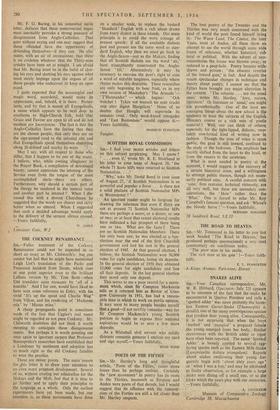THE COCKNEY RENAISSANCE.
SIR,—Fuller treatment of the Cockney Renaissance could not be expected in so short an essay as Mr. Chilworth's: but one cannot but feel that he might have mentioned Leigh Unt's translation of the Paolo and Francesca incident from Dante, which rises at one point superior even to the brilliant Lallans version by Mr. Tom Scott—when
Unt translates Julio tremante by ' all of a tremble.' And I for one, would have liked to have seen some reference to Enley, with his vivid It's up the spout and Charlie Wag' from Villon, and his rendering of Madonna mia ' by ' Missus mine.'
A cheap propaganda point is sometimes made of the fact that Uggins's real name might be regarded as not pure Cockney. Mr. Chilworth doubtless did not think it worth stooping to anticipate these disingenuous sneers. But perhaps it is worth pointing out once again to ignorant earners that Professor Boocoprides's researches have established that a Londoner by sentiment and adoption has as much right as the old Cockney families to wear the pearlies.
These are minor points. The main reason for this letter is to draw your attention to an even more pregnant development. Several of us, without abating our admiration for the Makars and the Mob, feel that it is time to go further and to apply their principles to the language as a whole. Only the earliest experiments have yet been made, but our intention is, as these movements have done
on a smaller scale, to replace the bastard ' Standard' English with a rich idiom drawn from every dialect in these islands. Our main principle is to avoid the worn coinage of present speech: if all the available dialects past and present use the same word as stan- dard English, why ,then we must go back to the Anglo-Saxon—just as the Makars, finding that all Scottish dialects use the word air,' have triumphantly resurrected the Anglo-
Saxon ' lift.' Alternatively it may be necessary to exercise the poet's right to coin a word of suitable tanginess, especially where rhyme makes this desirable. These researches are only beginning to bear fruit, as in my own version of Macaulay's ' The Armada'- `
T'Harmailder' — which begins: Och wotcher 1 Tykes vot wunsch ter ear crackt oop ahrr iligint Hangelant.' None of us doubts that Hanglic will supersede its anaemic rival. Only weak-kneed renegades and ' East Bostonians' would oppose it.— Yours. faithfully, .
Tangier. MAHMUD FEINSTEIN


































 Previous page
Previous page